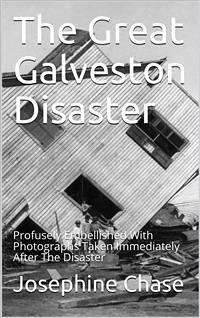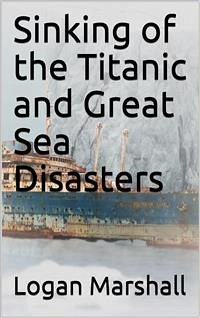
The Great Galveston Disaster / Containing a Full and Thrilling Account of the Most Appalling Calamity of Modern Times Including Vivid Descriptions of the Hurricane and Terrible Rush of Waters; Immense Destruction of Dwellings, Business Houses, Churches, a (eBook, PDF)
Sofort per Download lieferbar
5,49 €
inkl. MwSt.

PAYBACK Punkte
0 °P sammeln!
Containing a Full and Thrilling Account of the Most Appalling Calamity of Modern Times Including Vivid Descriptions of the Hurricane and Terrible Rush of Waters; Immense Destruction of Dwellings, Business Houses, Churches, and Loss of Thousands of Human Lives; Thrilling Tales of Heroic Deeds; Panic-Stricken Multitudes and Heart-Rending Scenes of Agony; Frantic Efforts to Escape a Horrible Fate; Separation of Loved Ones, etc., etc.; Narrow Escapes from the Jaws of Death; Terrible Sufferings of the Survivors; Vandals Plundering Bodies of the Dead; Wonderful Exhibitions of Popular Sympathy; Milli...
Containing a Full and Thrilling Account of the Most Appalling Calamity of Modern Times Including Vivid Descriptions of the Hurricane and Terrible Rush of Waters; Immense Destruction of Dwellings, Business Houses, Churches, and Loss of Thousands of Human Lives; Thrilling Tales of Heroic Deeds; Panic-Stricken Multitudes and Heart-Rending Scenes of Agony; Frantic Efforts to Escape a Horrible Fate; Separation of Loved Ones, etc., etc.; Narrow Escapes from the Jaws of Death; Terrible Sufferings of the Survivors; Vandals Plundering Bodies of the Dead; Wonderful Exhibitions of Popular Sympathy; Millions of Dollars Sent for the Relief of the Stricken Sufferers
Profusely Embellished With Photographs Taken Immediately After The Disaster
The Great Galveston hurricane, known regionally as the Great Storm of 1900, was the deadliest natural disaster in United States history, one of the deadliest hurricanes (or remnants) to affect Canada, and the fourth-deadliest Atlantic hurricane overall. The hurricane left between 6,000 and 12,000 fatalities in the United States; the number most cited in official reports is 8,000. Most of these deaths occurred in and near Galveston, Texas, after storm surge inundated the coastline with 8 to 12 ft (2.4 to 3.7 m) of water. In addition to the number killed, the storm destroyed about 7,000 buildings of all uses in Galveston, which included 3,636 destroyed homes; every dwelling in the city suffered some degree of damage. The hurricane left approximately 10,000 people in the city homeless, out of a total population of nearly 38,000. The disaster ended the Golden Era of Galveston, as the hurricane alarmed potential investors, who turned to Houston instead. In response to the storm, three engineers designed and oversaw plans to raise the Gulf of Mexico shoreline of Galveston island by 17 ft (5.2 m) and erect a 10 mi (16 km) seawall.
The great storm brought flooding and severe thunderstorms to portions of the Caribbean, especially Cuba and Jamaica. It is likely that much of South Florida experienced tropical storm-force winds, though mostly minor damage occurred. Hurricane-force winds and storm surge inundated portions of southern Louisiana, though the cyclone left no significant structural damage or fatalities in the state. The hurricane brought strong winds and storm surge to a large portion of east Texas, with Galveston suffering the brunt of the impact. Farther north, the storm and its remnants continued to produce heavy rains and gusty winds, which downed telegraph wires, signs, and trees in several states. Fatalities occurred in other states, including fifteen in Ohio, six in Wisconsin, two in Illinois, two in New York, one in Massachusetts, and one in Missouri. Damage from the storm throughout the United States exceeded $34 million. The remnants also brought severe impact to Canada. In Ontario, damage reached about $1.35 million, with $1 million to crops. The remnants of the hurricane caused at least 52 deaths – and possibly as many as 232 deaths – in Canada, mostly due to sunken vessels near Newfoundland and the French territory of Saint-Pierre. Throughout its path, the storm caused more than $35.4 million in damage.
Profusely Embellished With Photographs Taken Immediately After The Disaster
The Great Galveston hurricane, known regionally as the Great Storm of 1900, was the deadliest natural disaster in United States history, one of the deadliest hurricanes (or remnants) to affect Canada, and the fourth-deadliest Atlantic hurricane overall. The hurricane left between 6,000 and 12,000 fatalities in the United States; the number most cited in official reports is 8,000. Most of these deaths occurred in and near Galveston, Texas, after storm surge inundated the coastline with 8 to 12 ft (2.4 to 3.7 m) of water. In addition to the number killed, the storm destroyed about 7,000 buildings of all uses in Galveston, which included 3,636 destroyed homes; every dwelling in the city suffered some degree of damage. The hurricane left approximately 10,000 people in the city homeless, out of a total population of nearly 38,000. The disaster ended the Golden Era of Galveston, as the hurricane alarmed potential investors, who turned to Houston instead. In response to the storm, three engineers designed and oversaw plans to raise the Gulf of Mexico shoreline of Galveston island by 17 ft (5.2 m) and erect a 10 mi (16 km) seawall.
The great storm brought flooding and severe thunderstorms to portions of the Caribbean, especially Cuba and Jamaica. It is likely that much of South Florida experienced tropical storm-force winds, though mostly minor damage occurred. Hurricane-force winds and storm surge inundated portions of southern Louisiana, though the cyclone left no significant structural damage or fatalities in the state. The hurricane brought strong winds and storm surge to a large portion of east Texas, with Galveston suffering the brunt of the impact. Farther north, the storm and its remnants continued to produce heavy rains and gusty winds, which downed telegraph wires, signs, and trees in several states. Fatalities occurred in other states, including fifteen in Ohio, six in Wisconsin, two in Illinois, two in New York, one in Massachusetts, and one in Missouri. Damage from the storm throughout the United States exceeded $34 million. The remnants also brought severe impact to Canada. In Ontario, damage reached about $1.35 million, with $1 million to crops. The remnants of the hurricane caused at least 52 deaths – and possibly as many as 232 deaths – in Canada, mostly due to sunken vessels near Newfoundland and the French territory of Saint-Pierre. Throughout its path, the storm caused more than $35.4 million in damage.












